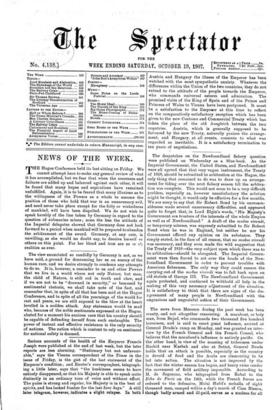Serious accounts of the health of the Emperor Francis Joseph
were published at the end of last week, but the later reports are less alarming. "Stationary but not unfavour- able," says the Vienna correspondent of the Times in the issue of Friday, is the gist of the last statement of the Emperor's condition; and Renter's correspondent, telegraph- ing a little later, says that "the huskiness seems to have entirely disappeared, so that his Majesty is able to speak quite distinctly in an ordinary tone of voice and without effort. The pulse is strong and regular, his Majesty is in the best of spirits, and has looked fresher for the last four days." A still later telegram, however, indicates a slight relapse. In both
Austria and Hungary the illness of the Emperor has been watched with the most sympathetic anxiety. Whatever the differences within the Union of the two countries, they do not extend to the attitude of the people towards the Emperor, who commands universal esteem and admiration. The promised visits of the King of Spain and of the Prince and Princess of Wales to Vienna have been postponed. It must be a satisfaction to the Empesor at this time to reflect on the comparatively satisfactory reception which has been given to the new Customs and Commercial Treaty which has taken the place of the old Ausgleich between the two countries. Austria, which is generally supposed to be favoured by the new Treaty, naturally praises the arrange- ment, and Hungary, at all events, consents to what was regarded as inevitable. It is a satisfactory termination to ten years of negotiations.










































